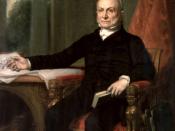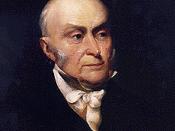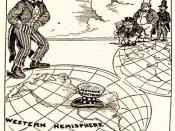"We should consider any attempt on [Europe's] part to extend their system [of government] to any portion of this hemisphere as dangerous to our peace and safety," President James Monroe proclaimed in his 1823 State of the Union address to Congress. His famous address, subsequently known as the Monroe Doctrine, declared the Western Hemisphere closed to European colonization and influence, thus establishing an American sphere of influence for the first time in the nation's young history. Shortly before the Monroe Doctrine, the United States formally recognized the new republics of Latin America, beginning the first century of Latin American-U.S. foreign relations with Monroe's address before the House of Representatives on January 30, 1822. The relationship between the United States and its neighbors to the South grew gradually. The United States slowly shifted from acting as an arbiter in Latin American affairs, merely looking out for its best interests from the outside, to a steady, escalating period of U.S.
investment and political intervention. A mounting desire for economic prosperity and profit by the United States government and American-owned businesses led to the shift in involvement and caused the political and economic interventions that characterized the first century of Latin American-U.S. relations, interventions that resulted in American domination in the economic development of Latin America.
In the first half of the nineteenth century, the United States exhibited a growing lust for new land. In the age of Manifest Destiny, expansionist fervor denominated American political and social thought. With the establishment of Latin America as the United States' sphere of influence, many Americans looked to their proverbial backyards for new territories. For example, Secretary of State John Quincy Adams suggested Cuba and Puerto Rico as perfect additions to the United States. In a letter to a U.S. diplomat for Spain, Hugh...


